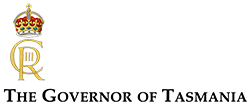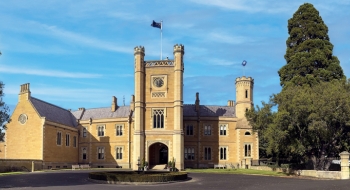Role of the Governor
Introduction
The Governor is The King’s representative in Tasmania and exercises the constitutional powers of the Head of State in Tasmania. The Governor acts on the advice of her/his Ministers in respect of constitutional matters, except in respect of reserve powers in rare circumstances (see below).
The Office of the Governor is apolitical and is distinct from that of the head of the elected Government, the Premier.
The Governor is appointed by His Majesty The King on the advice of the Premier of Tasmania. The appointment is made by a document called a Commission, which is signed by The King. The term of Governor is ‘at The King’s pleasure’, meaning there is no fixed term. In practice, the Premier reaches an agreement with an incoming Governor that she or he will serve for a specified period. The term is usually five years.
As well as constitutional powers and duties, the Governor has many ceremonial and community duties in Tasmania.
Constitutional Powers and Duties
Essentially the Governor’s role is to safeguard the Tasmanian Constitution by ensuring that there is an orderly transition from one government to the next, and to facilitate the work of the Parliament and the government of the State.
The Governor’s constitutional role includes:
- dissolving Parliament and issuing writs (commands) for a general election;
- appointing the Premier and Ministers;
- assenting to Bills passed by both Houses of Parliament, making them laws;
- presiding over meetings of the Executive Council;
- issuing regulations and proclamations;
- appointing judges, royal commissioners, and individuals to statutory boards and to tribunals.
The Executive Council consists of the Premier and Ministers and is presided over by the Governor. The Executive Council is the legal authority for making regulations, proclamations, and appointments. The Governor has the duty to ensure that the processes of the Executive Council are conducted lawfully and regularly, and may ask questions and seek further information from Ministers.
The Governor has regular meetings with the Premier to discuss matters of State business, although the Governor must remain detached from party politics.
Reserve Powers
The reserve powers exist to ensure that fundamental constitutional principles of parliamentary democracy and responsible government are upheld and maintained. The Governor may act contrary to advice of his or her Ministers when exercising a reserve power, such as dismissing a Premier after being defeated in the House of assembly in a vote of no-confidence and she or he refuses to resign, or when he or she is acting unlawfully.
Ceremonial Duties
The Governor officiates at many important State ceremonies including:
- the Opening of the Parliament of Tasmania;
- Swearing-in the Premier and Ministers and Supreme Court Justices;
- the investiture of Australian honours, Citizenship ceremonies and other service and bravery awards;
- representing the people of Tasmania at the Anzac Day commemoration and other important commemorations such as Remembrance Day and Vietnam Veterans’ Day;
- opening of major conferences and important new buildings and facilities.
Community Duties
The Governor has important community roles in helping to foster a sense of unity and in promoting values and ideals that support a strong community through mutual respect, tolerance, support and goodwill.
The Governor is Patron of many organisations. Emeritus Professor Chalmers is also Co-Patron of several organisations. The Governor receives courtesy calls, including from many community organisations, from Consular officials, from Spiritual Leaders and from Defence personnel. The Governor hosts official State visits of Ambassadors and High Commissioners.
The Governor has a role in encouraging and recognising high achievement in the arts, industry, education, sport, and community service. The Governor conveys, on behalf of the community, recognition and gratitude to those who make these contributions and encourages Tasmanians to be a caring society.
As part of the important community engagement role the Governor:
- hosts receptions for local, state and national organisations and groups;
- visits each of Tasmania’s 29 Councils;
- hosts school students at Government House as part of their education about our system of government;
- visits schools to speak with students and staff or to present awards;
- hosts fundraising events;
- speaks at events for many Tasmanian organisations;
- works with stakeholders to raise awareness of issues within the community and implement evidence-based solutions;
- attends University Graduation ceremonies;
- attends statewide events for local, state and national organisations; and
- sends congratulatory messages to Tasmanians on significant anniversaries.
As part of the community engagement role, the Executive Chef and her team provide work experience to kitchen studies students and work placements; host a ‘Cook and Connect’ program for women’s groups; organise a ‘Kids to Farms’ experience for school groups; and prepare dinners at schools as fundraisers for their kitchen gardens.
Donations of meals made from Government House produce are sent to community groups, and flowers delivered to aged care homes.
Government House is open for guided Garden Tours, including its significant trees; State Room Tours; and Behind the Scenes Tours. These are provided on a regular basis through the year.
The heritage grass and en-tout-cas tennis courts and bowling/croquet green are available for use by the public.
Remuneration
Pursuant to the Governor of Tasmania Act 1982, the salary of the Governor is paid at the rate of 90% of the rate at which the salary of the Chief Justice of Tasmania is payable. The Governor lives at Government House during the term of office.





